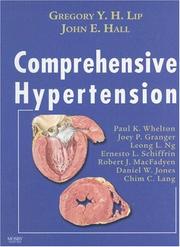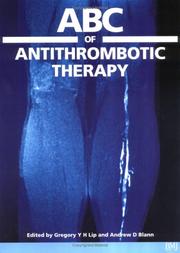| Listing 1 - 10 of 19 | << page >> |
Sort by
|

ISBN: 0323070671 0323039618 1336235462 9780323070676 9780323039611 Year: 2007 Publisher: Philadelphia, Pa. : Mosby Elsevier,
Abstract | Keywords | Export | Availability | Bookmark
 Loading...
Loading...Choose an application
- Reference Manager
- EndNote
- RefWorks (Direct export to RefWorks)
Here is today's most in-depth reference for any cardiologist, internist, or nephrologist interested in hypertension. Drawing from international experience in cardiology, physiology, and nephrology, Drs. Lip and Hall have assembled a group of section editors and contributors second to none. You'll find the long-term effects of primary and secondary hypertension and a lengthy section on hypertensions for special populations featured prominently. Prevention and treatment of hypertension are covered in detail, from lifestyle and diet issues to drug choice and delivery, and the section on compariso
Hypertension. --- Blood circulation disorders. --- Blood --- Circulation disorders --- Circulatory disorders --- Cardiovascular system --- Blood pressure, High --- High blood pressure --- Vascular hypertension --- Blood circulation disorders --- Circulation, Disorders of --- Diseases
Book
ISBN: 9781846920462 1846920469 9781846926181 1846926181 1282895419 9781282895416 9786612895418 Year: 2010 Publisher: Oxford, England Clinical Pub.
Abstract | Keywords | Export | Availability | Bookmark
 Loading...
Loading...Choose an application
- Reference Manager
- EndNote
- RefWorks (Direct export to RefWorks)
Aimed at doctors with a general interest in cardiology as well as specialists, 'Problem Solving in Cardiology' will appeal to a wide audience of physicians who routinely see patients with cardiovascular complications. This book presents a selection of challenging cases seen in everyday practice, highlighting learning points and recent developments made in the field. Each case is concise and formatted simply, logically leading the reader through clinical presentations, with an emphasis on pictorial learning including electrocardiograms, angiograms and algorithms for most cases.A key addition to
Cardiovascular Diseases --- Heart --- Diagnosis --- Therapy --- Diseases --- Diagnosis. --- Antemortem Diagnosis --- Diagnoses and Examinations --- Examinations and Diagnoses --- Postmortem Diagnosis --- Diagnose --- Antemortem Diagnoses --- Diagnoses --- Diagnoses, Antemortem --- Diagnoses, Postmortem --- Diagnosis, Antemortem --- Diagnosis, Postmortem --- Postmortem Diagnoses --- Disease --- Cardiovascular Disease --- Disease, Cardiovascular --- Diseases, Cardiovascular --- Cardiology --- Cardiopulmonary system --- Cardiovascular system --- Chest --- diagnosis --- Adverse Cardiac Event --- Cardiac Events --- Major Adverse Cardiac Events --- Adverse Cardiac Events --- Cardiac Event --- Cardiac Event, Adverse --- Cardiac Events, Adverse --- Event, Cardiac

ISBN: 0727917714 Year: 2003 Publisher: London : BMJ Publishing,
Abstract | Keywords | Export | Availability | Bookmark
 Loading...
Loading...Choose an application
- Reference Manager
- EndNote
- RefWorks (Direct export to RefWorks)
Digital
ISBN: 9783319424002 Year: 2017 Publisher: Cham Springer International Publishing
Abstract | Keywords | Export | Availability | Bookmark
 Loading...
Loading...Choose an application
- Reference Manager
- EndNote
- RefWorks (Direct export to RefWorks)
This book considers paradigmatic clinical cases in order to cast light on key issues relating to elective or emergency stent implantation and the use of oral anticoagulation (OAC) in patients with atrial fibrillation. The topics addressed include the optimal periprocedural antithrombotic treatment (uninterrupted vs interrupted OAC, intraprocedural use of heparin and glycoprotein IIb/IIIa inhibitors, etc.), the most appropriate type of stent (bare metal vs drug eluting vs “bioactive”), the optimal regimen (e.g., triple therapy of OAC, aspirin, and clopidogrel vs the combination of OAC and a single antiplatelet agent), and the most suitable duration of the antithrombotic treatment prescribed at discharge (1 vs 6–12 months). The case-based management recommendations will be of wide practical value in the current health care context, where percutaneous coronary intervention is available even to patients with relevant co-morbidities, such as those warranting long-term OAC, and the indications for OAC are much broader than in the past. The book will appeal especially to clinical and interventional cardiologists, internal medicine specialists, hematologists, and family physicians and will also be of interest to cardiology and internal medicine residents and fellows.
Blood physiology. Circulatory physiology --- Pharmacology. Therapy --- Semiology. Diagnosis. Symptomatology --- Pathology of the circulatory system --- Orthopaedics. Traumatology. Plastic surgery --- Surgery --- Human medicine --- farmacotherapie --- farmacologie --- spoedgevallen --- intensieve zorgen --- cardiologie --- angiografie --- hartchirurgie --- bloedsomloop --- intensieve-zorgen afdeling --- lymfevaten
Digital
ISBN: 9780323070676 0323070671 Year: 2007 Publisher: Philadelphia, Pa Mosby Elsevier
Abstract | Keywords | Export | Availability | Bookmark
 Loading...
Loading...Choose an application
- Reference Manager
- EndNote
- RefWorks (Direct export to RefWorks)
Here is today's most in-depth reference for any cardiologist, internist, or nephrologist interested in hypertension. Drawing from international experience in cardiology, physiology, and nephrology, Drs. Lip and Hall have assembled a group of section editors and contributors second to none. You'll find the long-term effects of primary and secondary hypertension and a lengthy section on hypertensions for special populations featured prominently. Prevention and treatment of hypertension are covered in detail, from lifestyle and diet issues to drug choice and delivery, and the section on comparison of guidelines is unique to this book. Find comprehensive coverage of hypertension including pathogenesis, prevention, and treatment all in one practical volume. See the complete systemic problems of hypertension at a glance with detailed, full-color illustrations of cellular and clinical manifestations. Simplify navigating the complexities of hypertension using algorithms for clinical exam and diagnosis. Get specific insight into prevention and treatment of hypertension in special populations. Go global with a comprehensive section on worldwide guidelines and the application of clinical material to local standards of practice.
Book
Year: 2017 Publisher: Cham : Springer International Publishing : Imprint: Springer,
Abstract | Keywords | Export | Availability | Bookmark
 Loading...
Loading...Choose an application
- Reference Manager
- EndNote
- RefWorks (Direct export to RefWorks)
This book considers paradigmatic clinical cases in order to cast light on key issues relating to elective or emergency stent implantation and the use of oral anticoagulation (OAC) in patients with atrial fibrillation. The topics addressed include the optimal periprocedural antithrombotic treatment (uninterrupted vs interrupted OAC, intraprocedural use of heparin and glycoprotein IIb/IIIa inhibitors, etc.), the most appropriate type of stent (bare metal vs drug eluting vs “bioactive”), the optimal regimen (e.g., triple therapy of OAC, aspirin, and clopidogrel vs the combination of OAC and a single antiplatelet agent), and the most suitable duration of the antithrombotic treatment prescribed at discharge (1 vs 6–12 months). The case-based management recommendations will be of wide practical value in the current health care context, where percutaneous coronary intervention is available even to patients with relevant co-morbidities, such as those warranting long-term OAC, and the indications for OAC are much broader than in the past. The book will appeal especially to clinical and interventional cardiologists, internal medicine specialists, hematologists, and family physicians and will also be of interest to cardiology and internal medicine residents and fellows.
Cardiology. --- Cardiac surgery. --- Critical care medicine. --- Pharmacotherapy. --- Angiology. --- Cardiac Surgery. --- Intensive / Critical Care Medicine.
Book
Year: 2017 Publisher: Cham : Springer International Publishing : Imprint: Springer,
Abstract | Keywords | Export | Availability | Bookmark
 Loading...
Loading...Choose an application
- Reference Manager
- EndNote
- RefWorks (Direct export to RefWorks)
This book considers paradigmatic clinical cases in order to cast light on key issues relating to elective or emergency stent implantation and the use of oral anticoagulation (OAC) in patients with atrial fibrillation. The topics addressed include the optimal periprocedural antithrombotic treatment (uninterrupted vs interrupted OAC, intraprocedural use of heparin and glycoprotein IIb/IIIa inhibitors, etc.), the most appropriate type of stent (bare metal vs drug eluting vs “bioactive”), the optimal regimen (e.g., triple therapy of OAC, aspirin, and clopidogrel vs the combination of OAC and a single antiplatelet agent), and the most suitable duration of the antithrombotic treatment prescribed at discharge (1 vs 6–12 months). The case-based management recommendations will be of wide practical value in the current health care context, where percutaneous coronary intervention is available even to patients with relevant co-morbidities, such as those warranting long-term OAC, and the indications for OAC are much broader than in the past. The book will appeal especially to clinical and interventional cardiologists, internal medicine specialists, hematologists, and family physicians and will also be of interest to cardiology and internal medicine residents and fellows.
Cardiology. --- Cardiac surgery. --- Critical care medicine. --- Pharmacotherapy. --- Angiology. --- Cardiac Surgery. --- Intensive / Critical Care Medicine.
Book
ISBN: 9780198870678 Year: 2023 Publisher: Oxford, United Kingdom ; New York, NY : Oxford University Press,
Abstract | Keywords | Export | Availability | Bookmark
 Loading...
Loading...Choose an application
- Reference Manager
- EndNote
- RefWorks (Direct export to RefWorks)
"The global prevalence of hypertension was estimated to be 1.13 billion in 2015, with the overall prevalence of around 26% of the world's population and around 30-4% of those aged 18 years and above. Hypertension is a risk factor for many cardiovascular, cerebrovascular and cardiovascular-related conditions, and hypertension substantially contributes to premature mortality. In 2017, it was estimated that hypertension is the leading modifiable risk factor for all-cause mortality worldwide, accounting for over 10 million deaths and 218 million disability-adjusted life years. It is believed that there is a global epidemic of yet unknown proportions as abnormally elevated blood pressures are often asymptomatic. Indeed, the first diagnosis of hypertension is often made when the individual presents with a myocardial infarction or a stroke. Hypertension is thus rightly often referred to as the 'silent killer'. Modifiable factors impacting hypertension include lifestyle changes such as smoking, diet and physical activity levels. Public health initiatives for hypertension such as population and opportunistic screening and patient education to promote 'heart healthy' lifestyles are critical for primary prevention, detection and management of hypertension"--
Hypertension. --- Cardiovascular Diseases. --- Hypertension artérielle. --- Maladies cardiovasculaires.
Book
Year: 2017 Publisher: Cham : Springer International Publishing : Imprint: Springer,
Abstract | Keywords | Export | Availability | Bookmark
 Loading...
Loading...Choose an application
- Reference Manager
- EndNote
- RefWorks (Direct export to RefWorks)
This book considers paradigmatic clinical cases in order to cast light on key issues relating to elective or emergency stent implantation and the use of oral anticoagulation (OAC) in patients with atrial fibrillation. The topics addressed include the optimal periprocedural antithrombotic treatment (uninterrupted vs interrupted OAC, intraprocedural use of heparin and glycoprotein IIb/IIIa inhibitors, etc.), the most appropriate type of stent (bare metal vs drug eluting vs “bioactive”), the optimal regimen (e.g., triple therapy of OAC, aspirin, and clopidogrel vs the combination of OAC and a single antiplatelet agent), and the most suitable duration of the antithrombotic treatment prescribed at discharge (1 vs 6–12 months). The case-based management recommendations will be of wide practical value in the current health care context, where percutaneous coronary intervention is available even to patients with relevant co-morbidities, such as those warranting long-term OAC, and the indications for OAC are much broader than in the past. The book will appeal especially to clinical and interventional cardiologists, internal medicine specialists, hematologists, and family physicians and will also be of interest to cardiology and internal medicine residents and fellows.
Cardiology. --- Cardiac surgery. --- Critical care medicine. --- Pharmacotherapy. --- Angiology. --- Cardiac Surgery. --- Intensive / Critical Care Medicine.
Book
ISBN: 9780470659625 0470659629 Year: 2015 Publisher: Chicester Wiley-Blackwell
Abstract | Keywords | Export | Availability | Bookmark
 Loading...
Loading...Choose an application
- Reference Manager
- EndNote
- RefWorks (Direct export to RefWorks)
Hypertension --- Blood Pressure Determination --- diagnosis --- therapy --- methods --- hypertensie --- diagnosis. --- therapy. --- methods.
| Listing 1 - 10 of 19 | << page >> |
Sort by
|

 Search
Search Feedback
Feedback About UniCat
About UniCat  Help
Help News
News